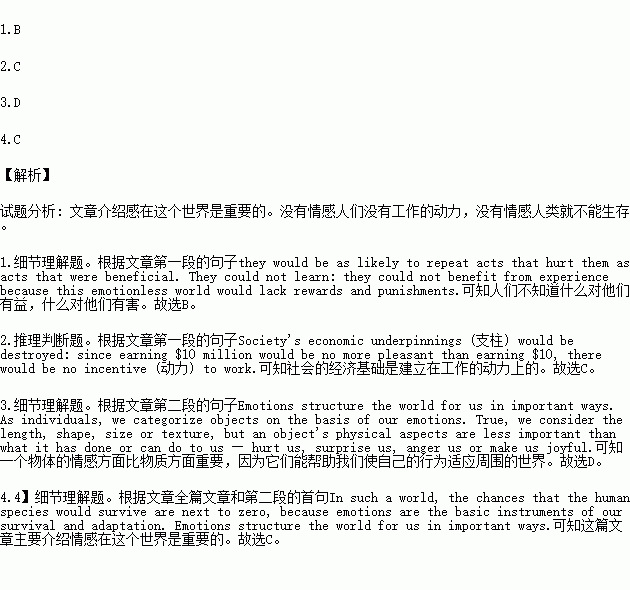题目内容
Imagine a world in which there were suddenly no emotion — a world in which human beings could feel no love or happiness, no terror or hate. Try to imagine the consequences of such a transformation. People might not be able to stay alive: knowing neither joy nor pleasure, anxiety nor fear, they would be as likely to repeat acts that hurt them as acts that were beneficial. They could not learn: they could not benefit from experience because this emotionless world would lack rewards and punishments. Society would soon disappear: people would be as likely to harm one another as to provide help and support. Human relationships would not exist: in a world without friends or enemies, there could be no marriage, affection among companions, or bonds among members of groups. Society's economic underpinnings (支柱) would be destroyed: since earning $10 million would be no more pleasant than earning $10, there would be no incentive (动力) to work. In fact, there would be no incentives of any kind, for as we will see, incentives mean a capacity to enjoy them.
In such a world, the chances that the human species would survive are next to zero, because emotions are the basic instruments of our survival and adaptation. Emotions structure the world for us in important ways. As individuals, we categorize objects on the basis of our emotions. True, we consider the length, shape, size or texture, but an object's physical aspects are less important than what it has done or can do to us — hurt us, surprise us, anger us or make us joyful. We also use categorizations colored by emotions in our families, communities, and overall society. Out of our emotional experience with objects and events comes a social feeling of agreement that certain things and actions are "good" and others are "bad", and we apply these categories to every aspect of our social life — from what foods we eat and what clothes we wear to how we keep promises and which people our group will accept. In fact, society uses our emotional reactions and attitudes, such as loyalty, morality, pride, shame, guilt, fear and greed, in order to maintain itself. It gives high rewards to individuals who perform important tasks such as surgery, makes heroes out of individuals for unusual or dangerous achievements such as flying fighter planes in a war, and uses the legal penal (刑法的) system to make people afraid to engage in antisocial acts.
1. Which of the following is TRUE according to the first paragraph?
A. people would not be able to tell the physical aspects of objects.
B. People would not know what was beneficial and what was harmful to them.
C. $ 10 million is equal to $ 10 in a world without emotions.
D. There would be full of lies, arguments and violence.
2. In can be inferred from the passage that the economic foundation of society is dependent on ________.
A. the ability to make money
B. the capacity to work
C. the motivation to work
D. our emotional experiences
3. Why are the emotional aspects of an object more important than its physical aspects?
A. They help society use its members for more profit.
B. They encourage us to perform important tasks in the war.
C. They help to perfect the legal and penal system to make people afraid.
D. They help us adapt our behaviors to the world surrounding us.
4.What is the text mainly about?
A. People could only live in a world with emotions.
B. People would always do bad things in the emotionless world.
C. Emotions are very important in the world.
D. Emotions structure the world for us in important ways.


 ),并在其下面写出该加的词。
),并在其下面写出该加的词。